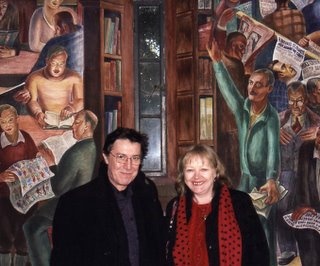
Last night, being Feburary of the 22nd, at Moe’s Books on Telegraph Ave. in the tent city of Berkeley, Geraldine Monk & Alan Halsey gave one of the more memorable poetry readings I can pull to mind. I’d even consider it one of a small handful in my poetry-reading-packed life that managed to engage and mesmerize from start to finish.
As likable as her poems are on the page, Geraldine’s Sheffield accent and world-weary resignation really seals the deal during the live version. Not just in the poems either, since she has all the energy and presence of a really fabulous stage performer, and her between-poem comments are provocative &/or hilarious down the line. Just a few of the many I might badly paraphrase: “Bloody hell! That’s my political comment for the night,” “Why am I reading this? Who wants to relive that? It was awful the first time around,” “Now I’m going to go have a cigarette and leave you in peace.” I feel like somewhere there is a gay community missing their diva.
It’s easy to see why Escafeld Hangings, which Geraldine read a lot from, comes with a CD where she performs the work--but that’s not to say the work isn’t smashing on the page. The attitude carries over and through and into the poems, with all their colloquial plays, their straining against the limitations of mute print, the assonance and typographic acrobatics. Some lines that have stayed with me: “many men / no fish,” “a city with no humor cannot be serious” and the rather spicerian “I walk through walls / I walk through walls / I walk through walls”…
Normally after being through a reading like that, it’s sort of over for me—I figure my limited attention is spent, and now somebody is supposed to follow? Unlikely. But Alan, in part because of his relative placidity, but mostly because of the fierce intellectual concentration and demand of his work, kept me present. In the car later on, David Brazil called Alan a “dictionary poet”--by which he means a poet who knows the full etymological significance, & often the social and political history, of each word and phrase used. His example was when Alan used the word distempered, which David had coincidently discovered that day to be related to a medieval theory of rising and falling blood, and then a line later Alan used the word “globin.” Whether David’s idea of this esoteric connection is right or not in this particular case hardly matters, because that’s still the kind of bookish depth you feel emanating from the work.
Alan read mostly from Marginalien, his recent & valuable selected. Did I say he has an English accent too? Well, like a lot of English, he does--not as pronounced as Geraldine’s, but sonorous, con gravitas. As the reading went on it was clear he has no lack of performative intensity & sense of aural architecture either. To me Alan’s work strives for a compression that I miss in a lot of contemporary American poets, who are maybe too afraid of being taken for modernists with such a tack? Anyways, I kept thinking “that’d make a great epigraph for somebody’s whole book,” then a few lines later I’d think, “well, that too,” and etc. etc. Some Halsey lines from the night still kicking around my mind: “sing or else,” “a passable order never quite / settles on the things men buy” and the terrifically succinct and perfectly current “the effect is energetic though the cause / is forgotten.” I also misheard his line “debt stifles debate” as “death stifles debate”—well, those’re both fine, but hey Alan, isn't mine swell too?
Last but not least: if anyone within the sound of this blog wishes to hear something extremely splendid, I hope they’ll find Alan and ask for an encore of his spirited reading of “Abiezer Coppe In Parenthesis.” A few bookstore shoppers came down the stairs during the reading of it, and truthfully I feared for them, for yea I saw the whiteness of their faces. While it’s a fragmented and paratactic poem Alan read it with a linear and discursive fire that an outsider could only have mistaken for madness. And it was madness, I felt. Part of a beautiful two-hour crack in rational time.

0 Comments:
Post a Comment
<< Home